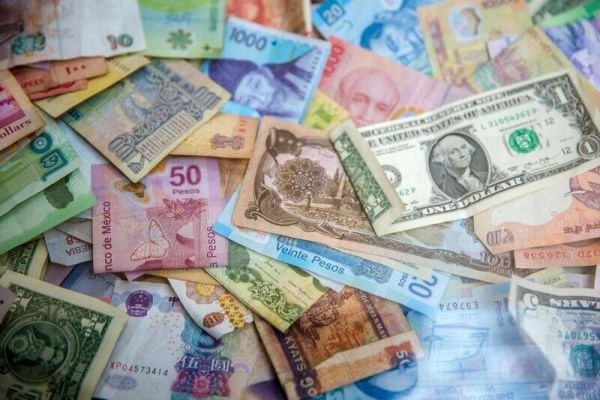So you want to transfer money abroad. Perhaps you want to treat a faraway relative on their birthday. Maybe you are moving to a new country, or you’re trying to pay for services from an international supplier or employee.
Whatever your reasons for sending money abroad, it can be hard to identify the safest, most secure and cost-effective way to do it. Global payments through your bank can be slow and expensive, and there’s hundreds of money transfer companies out there competing for your attention.
To make things less daunting, we've put together this step-by-step guide that explains everything you need to know about international money transfers, including what they are, how you can arrange one, the details you’ll need and the costs involved. Let’s get started.
Using FXcompared is simple.
After you click compare, your results will look like this:
The table below is live - feel free to interact with it and compare now.
An international money transfer allows you to move money from one country to another country – that could be via online bank accounts, digital wallets or cash collection and pickup.
You might send money abroad to make a purchase, give a gift to friends or family members, pay tuition fees or invest in foreign companies. Or you might be sending money for business purposes, such as paying international business partners or setting up a new branch overseas – we talk more about international money transfers for businesses here.
Most major banks will allow you to send money abroad – but this might not be the fastest, cheapest, safest or most convenient option.
Banks often have strict restrictions on the amount you can send overseas. They tend to charge higher fees, offer less competitive exchange rates, and take longer to transfer your money.
International money transfer companies, on the other hand, tend to be a much faster, safer and more efficient way to send money to another country. Depending on the company, they are able to send your money in a variety of different ways (online, via an app or over the phone) to bank accounts, mobile wallets or cash pickups worldwide.
There are a variety of different companies and methods for sending money transfers abroad, which we talk about in our extensive guide to money transfer companies and where we discuss how to find the best option.

The process may vary slightly depending on the method you choose to send money abroad. However, a typical, straightforward international money transfer consists of four steps:
You’ll find that sending money online is one of the easiest ways to send money overseas. Nearly all money transfer companies offer the option to transfer money online, and despite all the different money transfer companies there are to choose from, the process is very similar.
Transferring money online is simple. You can do so directly from your bank account, or, for smaller amounts, using a debit or credit card.
To transfer money online, you’ll visit the money transfer company’s website, and there will be an option to register. After clicking on that option, the website will ask where you are sending money to, and the amount that you would like to send. You will also be asked to create a profile to use the website.
Following your choice of amount and destination, you will be asked to enter your bank account information. Often, you will be able to pay with a debit or credit card.
Many mobile transfer companies offer the option to sign up and send through an app, boosting convenience. It’s important to note that most will require you to sign up and register to their service online before you can send money via the app.

Sending money abroad isn’t the same as sending it to another domestic bank account. Usually, you’ll be paying an extra charge to send the money internationally. This will be made up of two things:
Each money transfer company has a different method for calculating their offered exchange rate between two currencies, which can cause a large variance in cost between the companies. Some companies say they are ‘fee-free’, but usually that just means it will be factoring the charge into their exchange rate.
The main consideration you need to make is this: for the amount of money that I am sending, what is the amount that will be received in the country I am sending to?
When arranging an international money transfer, it’s important to remember that currencies are volatile: there’s always the chance that the exchange rate now will be substantially different in a few months, and situations can change rapidly.
For example, depending on whether you want to share one large sum at once, or send regular payments to the same account overseas, this might have an impact on how and when you transfer your money.
Generally speaking, there are three established ways to arrange an international money transfer:

The speed at which money transfer companies can send your money will still vary, depending on the payment method, the amount of money being sent, and the transfer route.
Instant transfers and 24-hour transfers are available, but some money transfer companies will charge higher fees to send your money faster.
The exact details you need for an international bank transfer depend on two things: the country your money will be going to and the currency it will be converted to.
To make an international money transfer, you will likely need some combination of (or all) of the following:
Exchange rates and fees are really important - but there are other considerations that you need to make when transferring money abroad. We’ve answered some of the main questions that you need to ask when making an international money transfer below.
Depending on whether you are sending money abroad for personal or business reasons, you may have very different priorities when choosing a money transfer operator. We talk a bit more about how the priorities for businesses and individuals might differ when it comes to international money transfers in the section below.
The amount you send abroad can have a serious impact on the money transfer company you choose to take charge of your transaction – particularly if the company marks up its exchange rate based on a percentage of the money to be exchanged.
Below, you can see how to compare providers for sending money abroad. FXcompared shows you both the fees and the exchange rate offered by different money transfer companies.
Different companies allow recipients to collect their money in different ways. It could be via a standard bank account, a mobile wallet or picking up cash from a specific location. Your specific needs are an important part of choosing a money transfer company.
Money transfer speeds vary depending on the operator. Trying to get money delivered instantly or within 24 hours can result in higher fees.
Not all money transfer companies send money to all countries, and some countries have different rules and regulations that will affect the speed at which you will receive your payment. That’s why you should always familiarise yourself with the specific money transfer regulations for the country you wish to send money to, and the regulations for the country you are sending money from.
A regular overseas payment plan is an effective way to transfer money abroad on a frequent basis. It is often suitable for customers who need to transfer three, four and smaller five figure amounts on a continual basis. Regular overseas payment plans are often used for:
Individuals might send money overseas for a variety of reasons. You could be doing something as simple as sending money to a friend, or you could be transferring a large amount of money in order to purchase real estate abroad.
While cost of transfer and exchange rates are to be considered, you should also consider whether or not these will be regular payments. In that case, you may want to work with a money transfer company that can automate your payments.
It is also important to consider who is receiving your money. Are you sending money to a grandparent who has retired overseas? In that case, you may want to transfer money directly into an account. But if you are sending money to someone without a regular bank account, perhaps a relative that is in need of assistance while traveling, you may want to find a money transfer company that has multiple agents internationally.
Of course, potentially one of the most important factors in your decision will be the speed of transfer.

While your company will also need to consider exchange rates and transaction fees, other details should be taken into account. As we’ve mentioned already, if your company is making a one-time international payment, your needs will be different than a company who will be regularly transferring money internationally.
A company that transfers money internationally on a regular basis or has known commitments in the future will likely want to work with a company that can offer them currency hedging products, such as forward contract or limit order options.
If the amount of money you are transferring is particularly large, it is important to examine the various exchange rates offered to your company. When sending large amounts of money overseas, a favourable exchange rate can make a large difference in money saved or lost. That’s why businesses need to be discerning in their choice of a money transfer company.
For our full guide to international money transfers for businesses, read our in-depth guide here. Or you can take a look at our sector-specific guides to money transfers below.
That’s where FXcompared can help. Whether you are sending money to friends and family or for business purposes, our easy-to-use comparison tool helps you choose the right money transfer company to suit your needs. Powered by up-to-date foreign exchange data, FXcompared allows you to compare currency brokers based on fees, exchange rates, transfer speeds, unique offers and more.
The more informed you are, the better deal you will get on your international money transfer. Want more information? We’ve collected our full list of guides below.
The cost of sending money overseas depends on the money transfer operator. Exchange rates and fees differ, depending on how transfer operators calculate their offered exchange rate.
With our comparison tool, you can see exactly how much it costs to transfer money abroad across a wide range of operators. We show you the exchange rate and fees you’ll incur with each operator so that you can make the most informed decision possible.
Different money transfer companies will allow you to send money to and from different countries. But remember: every country has different rules about transferring money, and it’s important you understand those rules before making a transfer.
Most money transfer companies will have different methods of recording transactions/receipt of transactions.
If you are using a bank: they will typically use a SWIFT code to track transfers. You are usually able to find this code on bank statements – if not, simply contact your bank.
If you are using a money transfer company: most of them will have a customer number, reference number or other code linked to the transaction that you can use to identify its progress, either online or when contacting the company’s customer service team. For example, Western Union will provide a unique tracking number (MTCN) that you can use to track the movement of your money online.
Always check that you are using a money transfer company that has been authorised (note – not just registered) by the relevant national authority. For example in the UK, this would be the Financial Conduct Authority.
This is vital to ensure that any money that you have shared with the company to be transferred is kept separate, which will make it possible to collect that money in the event that the company goes bankrupt.
Typically, money transfer companies are a cheaper, safer and more secure way to send money abroad than your local bank. However, different companies transfer money to different countries, accept different payment methods, or have different ways to deliver funds to recipients. It’s important to compare money transfer companies to ensure you are getting the best one to suit your needs.

Our exchange rates guides will help you understand the details of exchanging specific currencies and help familiarize you with popular currency pairs.
Here are some of our more popular guides:

Find out more about our industry leading research on the international payments and money transfer space. This includes our benchmark International Money Transfer Index (IMTI) used to measure the cost of sending bank to bank money transfers.
FXcompared.com is an fx money comparison site for international money transfer and to compare rates from currency brokers for sending money abroad. The website and the information provided is for informational purposes only and does not constitute an offer, solicitation or advice on any financial service or transaction. None of the information presented is intended to form the basis for any investment decision, and no specific recommendations are intended. FXC Group Ltd and FX Compared Ltd does not provide any guarantees of any data from third parties listed on this website. FX compared Ltd expressly disclaims any and all responsibility for any direct or consequential loss or damage of any kind whatsoever arising directly or indirectly from (i) any error, omission or inaccuracy in any such information or (ii) any action resulting therefrom.


